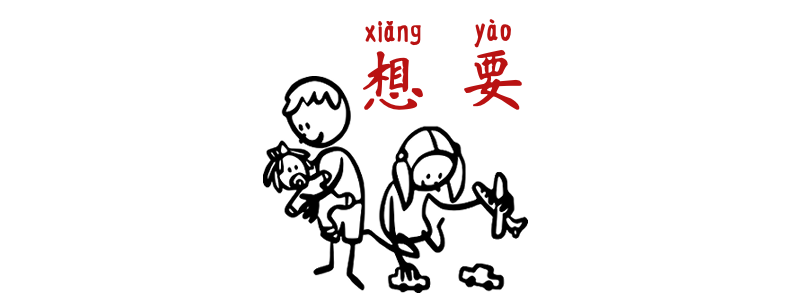Grammar Point:
There are three words in Chinese that can express the concept of ‘want’: 想 xiǎng, 要 yào, and 想要 xiǎngyào. However, they are not exactly the same and each has additional meanings attached to them.
想 xiǎng
想 xiǎng usually refers to a thought or an idea, without any definite plans or decisions made yet. In Chinese work culture, it is common to ‘offer a thought or an idea’ to supervisors rather than giving direct suggestions. Therefore, when talking to our bosses, we tend to use 想 xiǎng more often than 要 yào.
想 + Noun = to miss
我想奶奶我想奶奶
I miss my grandma.
我好想我的狗我好想我的狗
I miss my dog so much.
我很想你,你不想我嗎?我很想你,你不想我吗?
I miss you. Don’t you miss me?
想 + sentence = ponder; think
你想想看我們該怎麼做!你想想看我们该怎么做!
Try to think about what we should do!
我想那個人可能是外國人我想那个人可能是外国人
I think that person might be a foreigner.
FYI
Did you know that when Chinese people express their thoughts with “I think,” they often use 我觉得 wǒ juéde (I feel) instead of 我想 wǒ xiǎng (I think)? This is because using 我觉得 wǒ juéde sounds more polite and humble, without being too assertive. In some situations where sharing opinions may not be encouraged or might be impolite, using 我想 wǒ xiǎng might come across as too direct or forceful. Furthermore, by using 我觉得 wǒ juéde, speakers can convey a sense of open-mindedness and uncertainty, as if they are offering a suggestion instead of a definite answer.
想 + Verb = to want (but still just a thought no plan yet)
我今天中午想吃壽司我今天中午想吃寿司
I want to eat sushi for lunch today.
(It’s just a thought. You don’t have a restaurant in your mind yet.)
他不想學中國字他不想学中国字
He doesn’t want to learn Chinese characters.
要 yào
要 yào is a stronger expression of desire than 想 xiǎng, as it implies a greater level of willingness and decision. Therefore, it is usually not used when speaking to one’s boss or professor, although they may use it frequently when speaking to you. When ordering food, 要 yào is the appropriate term to use, as it reflects the decision you have made regarding your order.
要 + Noun = order food
我要一杯美式咖啡我要一杯美式咖啡
I’d like an Americano.
我的義大利麵不要蘑菇我的义大利面不要蘑菇
No mushrooms for my spaghetti.
要 + sentence = commands
我要你明天以前給我那個資料我要你明天以前给我那个资料
I need you to give me that information by tomorrow.
老師要我寫這個字十次老师要我写这个字十次
The teacher asked me to write this word 10 times.
(Do not use 問问 wèn to express the ask here. The character 問问 wèn is only use for asking a question.)
要 + Verb = to want (you have a plan or you have made a decision)
我今天中午要吃壽司我今天中午要吃寿司
I want to eat sushi for lunch today.
(I have a restaurant in my mind and I am pretty sure that I am going to eat today.)
他不要學中國字他不要学中国字
He is not going to learn Chinese characters.
想要 xiǎngyào
想要 xiǎngyào is a combination of 想 xiǎng and 要 yào, and therefore its meaning is somewhat intermediate between the two. It implies that you have a rough plan in mind, or that you are around 50% sure that something will happen. This is the most commonly used term when speaking with friends and colleagues.
想要 xiǎngyào + V/N/Sentence = to want
我下禮拜天想要去吃壽司,你去不去?我下礼拜天想要去吃寿司,你去不去?
I want to go to eat sushi next Sunday, do you want to go?
他想要我當他的女朋友他想要我当他的女朋友
He wants me to be his girlfriend.
我想要很多錢!我想要很多钱!
I want a lot of money!
Compare These Three “Wants”
他想我當他的女朋友他想我当他的女朋友
He hopes I can be his girlfriend.
他想要我當他的女朋友他想要我当他的女朋友
He wants me to be his girlfriend.
他要我當他的女朋友他要我当他的女朋友
He asked me to be his girlfriend.
Want
- Showing Future – Difference between 要 yào and 会 huì


